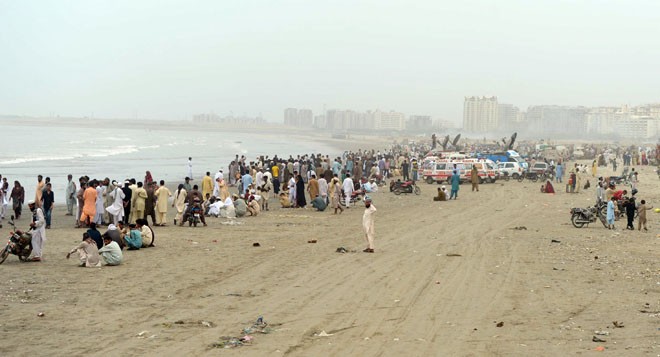
The sea devoured picnickers at Karachi beaches because ensuring safety is no one’s responsibility

It was one of the worst disasters on Karachi’s shore. The death toll was so stupefying that it caught the city’s administrators unawares, brought out all sorts of environmentalists clamouring with their "told-ya!" theses and the provincial government fumbling for explanations. Thirty-six people were swallowed up by the Arabian Sea at Karachi’s beaches on the first two days of Eid -- turning the happy holidays into a tragic memory for scores of families.
Was it a natural calamity that the bereaved should stoically accept and move on? Or was the tragedy a simple case of the government’s negligence, as it did not care to warn off beachgoers of high tides? Or perhaps the inescapable waves were a fallout of gradual environmental degeneration.
The Sindh government to find answers to such questions has formed a committee made up of senior government officials. They will submit a report soon. As happen in such cases.
But for the regular Karachiites the monsoonal mood swings of the sea is no secret. In the months of June, July and August, the sea is known for high tides. It is common knowledge that one should stay away from the beaches during these months.
On July 29 -- the first day of Eid -- at least seven teenage boys went missing. The news did not catch attention. Business went as usual. The next day, another 30 people vanished into the tides. That was when the alarm was raised.
There is no doubt that there was negligence on the government’s part. When the death toll rose to unprecedented level on the second day, it issued a back-dated notification of section 144 on the beaches.
The survivors and relatives of the victims say that had the government sealed the roads leading to the beaches on the second day, the disaster could have been averted. "When six people were killed by first evening, why did the government allow people to visit the same place the second day," asks Tariq Khan, 26, who lost his cousin on the first day of Eid.
Nevertheless, Commissioner Karachi Shoaib Ahmed Siddiqi, who came under fire for his unpreparedness, terms the disaster a "wake up" call for the various departments controlling the coastal edge of Karachi.
"As far as I know, the beach incident was the worst in the history of Karachi but you cannot blame any one party for the unfortunate incident," he says.
Siddiqui says that the management of Karachi’s beaches is a shared affair. The Karachi Port Trust (KPT), the Cantonment Board, the Defence Housing Authority (DHA) and Karachi Metropolitan Corporation (KMC) [which he oversees] are all together in the job with vaguely defined jurisdictions. "The lesson we can take from this disaster is to develop a complete beach safety mechanism."
He admitted that Karachi has no beach safety system in place. "There are seven lifeguards and no boats, we have to be honest -- we never worked on the issue," he says.
It is interesting to note that out of scores of victims, only three died on Hawksbay beach, some 12 kilometers from the main city, and the rest on the Clifton Beach, behind the Dolmen Mall.
The commissioner Karachi, however, says that had he employed all his resources, the administration could not have averted the disaster, "There were some 50,000 people on the beaches, given our meager resources I don’t think we could have handled a crowd that big. The people have to be responsible too -- especially, when it is about their own life."
But the environmentalists, on the other hand, claim they saw the disaster coming, and that the high tides were a result of the authority’s tampering with the oceanic ecosystem.
"The DHA and other land control authorities are re-claiming land from the sea at a massive scale," said Mohammad Ali, the chairman of Pakistan Fisher Folks Forum (PFF), an NGO that advocates for the rights of the fishing communities in Sindh.
He claims that the real estate companies are dredging the sea for land, which is disturbing the flow of the sea, "naturally, the sea will react. You cannot stop that from happening. If you encroach on the sea, cut the mangroves and think you can make profit -- you can’t. The sea has its own ways to respond."